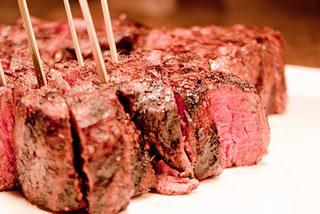 Recently, I returned to my home town of Melbourne, Australia for a visit. While I was there, the Australian news teams discovered some brutality going on in Indonesia. Australians were being slaughtered callously, slowly, unhygienically, unprofessionally.
Recently, I returned to my home town of Melbourne, Australia for a visit. While I was there, the Australian news teams discovered some brutality going on in Indonesia. Australians were being slaughtered callously, slowly, unhygienically, unprofessionally.No, I’m not talking about humans, I’m talking about livestock. A couple of reporters had gone into some Indonesian abattoirs (link here), and shot gruesome footage of cattle beating their own heads against concrete slaughterhouse walls in an attempt to escape, having their eyes gouged and tails broken in struggles, and bleeding slowly to death, from repeated ineffective cuts to the throat. We all had to watch it on national TV.
Initially, this caused an immediate cessation of exports to 6 major abattoirs, and the investigation of all other Indonesian meat production companies that accept livestock imports. Soon after, all live cattle exports to Indonesia were banned, and at 30 June, this was still in effect.
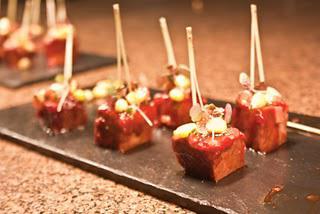 It made me ponder the standard of slaughter here in the UAE, and wonder if it is any better. This article on the RSPCA website of Australia shares my concerns. I’m not just talking about the standard of death, but the quality of produce that comes out the other end. A large proportion of meat available in Dubai is of course halal, so it is acceptable for consumption by Muslims. The slaughter of meat must be performed in a particular way, which involves the animal being bled dry while still alive.
It made me ponder the standard of slaughter here in the UAE, and wonder if it is any better. This article on the RSPCA website of Australia shares my concerns. I’m not just talking about the standard of death, but the quality of produce that comes out the other end. A large proportion of meat available in Dubai is of course halal, so it is acceptable for consumption by Muslims. The slaughter of meat must be performed in a particular way, which involves the animal being bled dry while still alive.Halal meat produced in Australia is done so under strict observation, so that the animals are thoroughly stunned during this process, but in many other parts of the world, this is not the case. Now
I am going to make a strong point here: I'm not saying that the UAE is one of the countries that produces this barbaric form of halal meat, and I'm also not assuming that haraam (non-halal) meat cannot also be produced in an inhumane fashion. But it does raise thought. The second issue is the bleeding of the animal - does this cause a less tender meat? I know I have not been able get a juicy chicken in the UAE. Is this why?
The other time I found myself questioning the meat I buy was at a foodie tour organized by Atlantis on Palm Jumeirah recently, which wound it’s culinary journey past Seafire, their signature meatery, and Time Out Dubai's top steakhouse for 2011.
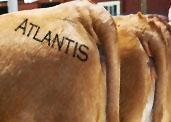 Why? Because their chef won’t buy meat that is slaughtered here.
Why? Because their chef won’t buy meat that is slaughtered here. Atlantis have their own breeded and branded cattle, which is raised on grass in lush pasture of the Queensland outback, then for the last 300 days of its life it is fattened on grain and hay. All the nastiness is done in the nicest possible way in Australia, before the parcels are snapped into vacuumed plastic sheathes and then shipped over for our consumption here in Dubai. This shipping gives the meat the perfect amount of time to age nicely in transit, so that by the time it lands on our plate, it is perfect.
It’s something to be proud of, isn’t it? I mean, here in Dubai, they may selectively buy watches from Switzerland, handbags from Italy, cut diamonds from Belgium, gadgets from Japan and cars from Germany, but hey, us Aussies really know how to deliver up a great piece of dead cow.
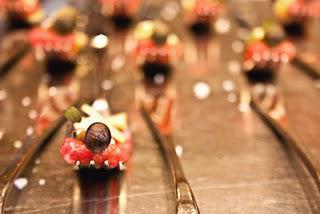
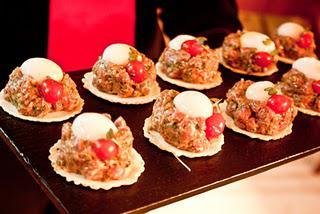 So we tried the meat, in many forms, including slow cooked, flame grilled, rare and raw. All were stupendously good, and although they knew the bunch of foodies were coming (so they had plenty of time to prepare) they put on a good show. Hype justified.
So we tried the meat, in many forms, including slow cooked, flame grilled, rare and raw. All were stupendously good, and although they knew the bunch of foodies were coming (so they had plenty of time to prepare) they put on a good show. Hype justified.They even managed to convert me to strip loin (known in my part of the world as porterhouse), which is a cut I have never favoured. It’s always been the tougher choice, where eye fillet (tenderloin) is the gristle-free nugget of meat purity, and rib-eye (scotch fillet) is the richer and softer option (if a little fatty in parts). But at Seafire, the strip loin is my choice - it tastes like butter. It’s softly chewy, melts a little, and the meatiest of the lot. Quite a surprise.
We also had some lovely carpaccio, beef tartare with a particularly gooey quail egg that my tabletalk friends gobbled up in taste and theory (60 degree bath-cooked so it remains looking wobbly and snot-like… In a good way), and some flaky gelatinous ribs in Jack-Daniels BBQ marinade – sounds cliché, but so classic in its execution – and left me wanting much, much more.
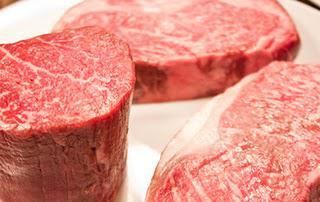 We talked beef and grain for a while. Chef Sasha likened the process of grain feeding to the couch-potatofication of the Arnold Schwarzenegger specimen. While a cow is in paddock, they eat grass, the Atkins diet for beef. Then, a clever farmer figures out that if they stick them in a shed and feed them grain, it does the same to the cow as putting Arnie on a couch, making him watch soap opera and feeding him thick shakes and potato chips. Mmmmm soft muscle. And the cuts they showed us demonstrated this – just like in Wagyu beef, marbled (marble rating of 4) with fat globules just big enough to dissolve with heat. It makes for a very tender steak.
We talked beef and grain for a while. Chef Sasha likened the process of grain feeding to the couch-potatofication of the Arnold Schwarzenegger specimen. While a cow is in paddock, they eat grass, the Atkins diet for beef. Then, a clever farmer figures out that if they stick them in a shed and feed them grain, it does the same to the cow as putting Arnie on a couch, making him watch soap opera and feeding him thick shakes and potato chips. Mmmmm soft muscle. And the cuts they showed us demonstrated this – just like in Wagyu beef, marbled (marble rating of 4) with fat globules just big enough to dissolve with heat. It makes for a very tender steak.And where would Seafire's chef buy their meat for home consumption? He'd order and pay for it through work, or if unable, would buy it from Spinneys.
So… have I turned you into vegetarians yet?
--------------------------------
Seafire is at Atlantis, Dubai, on the Crescent of Palm Jumeirah
ph. 04 426 2626
And I'm definitely going back for dinner soon - I'm an omnivore through and through.
Leave me a comment and make my day...
